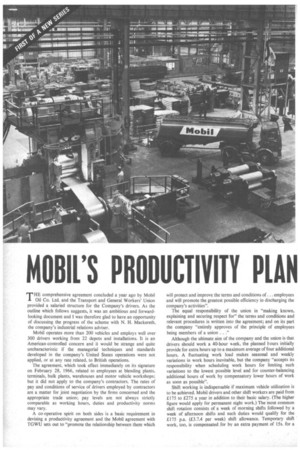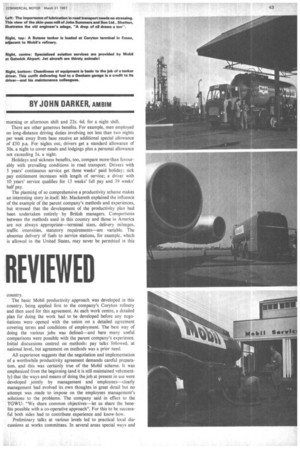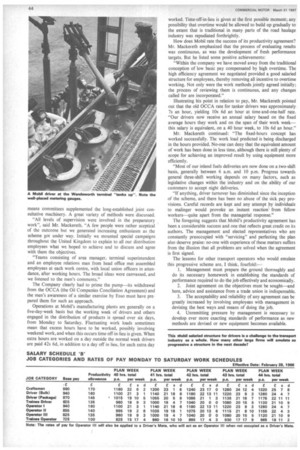MOBIL'S PRODUCTIVITY PLAN REVIEWED
Page 44

Page 45

Page 46

If you've noticed an error in this article please click here to report it so we can fix it.
THE comprehensive agreement concluded a year ago by Mobil Oil Co. Ltd. and the Transport and General Workers' Union provided a salaried structure for the Company's drivers. As the outline which follows suggests, it was an ambitious and forwardlooking document and 1 was therefore glad to have an opportunity of discussing the progress of the scheme with N. H. Mackereth, the company's industrial relations adviser.
Mobil operates more than 200 vehicles and employs well over 300 drivers working from 22 depots and installations. It is an American-controlled concern and it would be strange and quite uncharacteristic if the managerial techniques and standards developed in the company's United States operations were not. applied, or at any rate related, to British operations.
The agreement, which took effect immediately on its signature on February 28, 1966, related to employees at blending plants, terminals, bulk plants, warehouses and motor vehicle workshops; but it did not apply to the company's contractors. The rates of pay and conditions of service of drivers employed by contractors are a matter for joint negotiation by the firms concerned and the appropriate trade union; pay levels are. not always strictly comparable as working hours, duties and productivity norms may vary.
A co-operative spirit on both sides is a basic requirement in devising a productivity agreement and the Mobil agreement with TGWU sets out to "promote the relationship between them which will protect and improve the terms and conditions of. .. employees and will promote the greatest possible efficiency in discharging the company's activities".
The equal responsibility of the union in "making known, explaining and securing respect for" the terms and conditions and relevant procedures is written into the agreement; and on its part the company "entirely approves of the principle of employees being members of a union . ."
Although the ultimate aim of the company and the union is that drivers should work a 40-hour week, the planned hours initially provide for extra hours up to a maximum average of four additional hours. A fluctuating work load makes seasonal and weekly variations in work hours inevitable, but the company "accepts its responsibility when scheduling work hours for limiting such variations to the lowest possible level and for counter-balancing additional hours of work by compensatory lower hours of work as soon as possible".
Shift working is indispensable if maximum vehicle utilization is to be achieved. Mobil drivers and other shift workers are paid from £175 to £275 a year in addition to their basic salary, (The higher figure would apply for permanent night work.) The most common shift rotation consists of a week of morning shifts followed by a week of afternoon shifts and such duties would qualify for the £175 p.a. (£3.7.4 per week) shift allowance. Temporary shift work, too, is compensated for by an extra payment of 15s. for a country.
The basic Mobil productivity approach was developed in this country, being applied first to the company's Coryton refinery and then used for this agreement. At each work centre, a detailed plan for doing the work had to be developed before any negotiations were opened with the union on a detailed agreement covering terms and conditions of employment. The best way of doing the various jobs was defined—and here many useful comparisons were possible with the parent company's experience. Initial discussions centred on methods: pay talks followed, at national level, but agreement on methods was a prior need.
All experience suggests that the negotiation and implementation of a worthwhile productivity agreement demands careful preparation, and this was certainly true of the Mobil scheme. It was emphasized from the beginning (and it is still maintained vehemently) that the ways and means of doing the job at present in use were developed jointly by management and employees—clearly management had evolved its own thoughts in great detail but no attempt was made to impose on the employees management's solutions to the problems. The company said in effect to the TGWU: "We share common objectives—let us share the benefits possible with a co-operative approach". For this to be successful both sides had to contribute experience and know-how.
Preliminary talks at various levels led to practical local dis-. cussions at works committees. In several areas special ways and means committees supplemented the long-established joint consultative machinery. A great variety of methods were discussed.
"All levels of supervision were involved in the preparatory work", said Mr. Mackereth. "A few people were rather sceptical of the outcome but we generated increasing enthusiasm as the scheme got under way. Initially we mounted special campaigns throughout the United Kingdom to explain to all our distribution employees what we hoped to achieve and to discuss and agree with them the objectives.
"Teams consisting of area manager, terminal superintendent and an employee relations man from head office met assembled employees at each work centre, with local union officers in attendance, after working hours. The broad ideas were canvassed, and we listened to the men's comments."
The Company clearly had to prime the pump—its withdrawal from the OCCA (the Oil Companies Conciliation Agreement) and the men's awareness of a similar exercise by Esso must have prepared them for such an approach.
Operations at Mobil's manufacturing plants are generally on a five-day-week basis but the working week of drivers and others engaged in the distribution of products is spread over six days, from Monday to Saturday. Fluctuating work loads sometimes mean that excess hours have to be worked, possibly involving weekend work, and when this occurs time-off-in-lieu is given. When extra hours are worked on a day outside the normal week drivers are paid 42s 6d, in addition to a day off in lieu, for each extra day worked. Time-off-in-lieu is given at the first possible moment; any possibility that overtime would be allowed to build up gradually to the extent that is traditional in many parts of the road haulage industry was repudiated forthrightly.
How does Mobil rate the success of its productivity agreement? Mr. Mackereth emphasized that the process of evaluating results was continuous, as was the development of fresh performance targets. But he listed some positive achievements: "Within the company we have moved away from the traditional conception of low basic pay compensated by high overtime. The high efficiency agreement we negotiated provided a good salaried structure for employees, thereby removing all incentive to overtime working. Not only were the work methods jointly agreed initially; the process of reviewing them is continuous, and any changes called for are incorporated."
Illustrating his point in relation to pay, Mr. Mackereth pointed out that the old OCCA rate for tanker drivers was approximately 7s an hour, yielding lOs 6d an hour at time-and-one-half rate. "Our drivers now receive an annual salary based on the fixed average hours they work and on the span of their work week— this salary is equivalent, on a 40 hour week, to lOs 6d an hour."
Mr. Mackereth continued: "The fixed-hours concept has worked successfully. The work load predicted is being discharged in the hours provided. No-one can deny that the equivalent amount of work has been done in less time, although there is still plenty of scope for achieving an improved result by using equipment more efficiently.
"Most of our inland fuels deliveries are now done on a two-shift basis, generally between 6 a.m. and 10 p.m. Progress towards general three-shift working depends on many factors, such as legislative changes within the industry and on the ability of our customers to accept night deliveries.
"If anything, driver turnover has diminished since the inception of the scheme, and there has been no abuse of the sick pay provisions. Careful records are kept and any attempt by individuals to malinger would provoke an instant reaction from fellow workers—quite apart from the managerial response."
The foregoing suggests that Mobil's productivity agreement has been a considerable success and one that reflects great.credit on its authors. The management and elected representatives who are constantly preoccupied with "servicing" and perfecting the plan also deserve praise: no-one with experience of these matters suffers from the illusion that all problems are solved when the agreement is first signed.
The lessons for other transport operators who would emulate this progressive scheme are, I think, fourfold: 1. Management must prepare the ground thoroughly and do its necessary homework in establishing the standards of performance required to do the job effectively and economically.
2. Joint agreement on the objectives must be sought—and here, advice and assistance from a trade union is indispensable.
3. The acceptability and reliability of any agreement can be greatly increased by involving employees with management in devising the best ways and means of doing the job.
4. Unremitting pressure by management is necessary to develop ever more exacting standards of performance as new methods are devised or new equipment becomes available.
















































































































